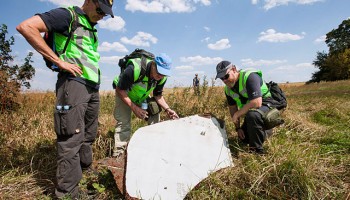The story published in August by the Russian investigative website Project and the independent business Bell magazine reads like a crime drama directed by the former head of the banking oversight department of the Federal Security Services (FSB), Russia’s intelligence agency.
Colonel Kyrill Cherkalin has been arrested and charged with corruption in May. Raiding his home, police reportedly found some 12 billion rubles ($180 million) in cash, as well as precious jewelry.
Project and Bell now offered a story that could explain where the money came from and it involves billions of rubles (US$ hundreds of millions), tough guys, money laundering and racketeering.
Cherkalin headed FSB’s so-called Department K, which is in charge of the country’s economic security and has been overseeing banks, pension funds and insurance companies. Department officials either demanded the banks to pay them up to 0.2 % of all cash withdrawals or “took bribes and payoffs for specific violations,” read the report citing sources close to the FSB.
Department K had even developed ways to make sure the percentage was paid. It would force the banks to employ a retired FSB officer who would have his own office, driver, car, a top salary and who would be monitoring the cash flow and collecting information about the market.
Young intelligence officer Cherkalin, 38, reportedly, wanted to reach the FSB’s top circles and did his best to improve these existing practices at Department K.
In summer 2014, Cherkalin met in a luxurious Moscow’s downtown cafe with banker Alexander Zheleznyak, who was co-owner of Life, a large financial holding at the time, according to the report.
“Cherkalin immediately got down to business, suggesting that a retired officer from the FSB be made vice-president at Probiznesbank (one of Life’s main assets) with an annual salary of US$120,000, a private office, personal driver and assistant,” the report said quoting parts of the statement Zheleznyak gave under oath in the United States, where he fled.
However, that was not the only demand, as Zheleznyak was also asked to “cede a large stake in Life to a company that will share its income with senior officials from the FSB and the Prosecutor General’s Office.”
Following the meeting, Zheleznyak and his friend and co-owner of Life, Segrei Leontiev, had seen no other option but to accept the offer involving Probiznesbank. However, they decided not to hand over shares in all their businesses.
This resulted in their banking licenses being revoked by the regulator and criminal cases launched against them, which made Zheleznyak and Leontiev flee the country, according to the report.
While the Russian Central Bank has been insisting that Life had gone bankrupt due to illegal financial activities, Zheleznyak claims it all happened because of pressure from the authorities.
The Life episode was just part of a series of similar actions involving high ranking officers of the FSB’s Department K. The scheme goes back to early 2000, when “commercially-minded FSB officers rose to power” and at the same time “as Russia’s money laundering business was booming.”
The system controlled by Cherkalin, according to the report, was built up over several years, and was “familiar to many bankers, particularly those involved in the money laundering business,” and maintaining close ties to both FSB and criminal gangs.
Most of the victims of the scheme have found refuge far from Russia - in Germany, America, even Australia. Some of them, like Zheleznyak, decided to reveal the notorious racketeering network camouflaged as the country’s security service.
While FSB did not comment on the allegations, the report quotes sources close to the agency as saying that Cherkalin was jailed because of “infighting” for FSB’ top position.
The agency’s director Alexander Bortnikov, reportedly, is to retire soon, thus provoking low-kick fights among potential successors of the top chair of what is considered the most powerful institution in Russia.
One way or the other, Cherkalin is out of the race.
The report says that prison monitors who visited him at the end of May, said they were “surprised to see him wearing an expensive Givenchy tracksuit,” while his cell was “decorated with so many icons that it could be compared to an Orthodox chapel.”






